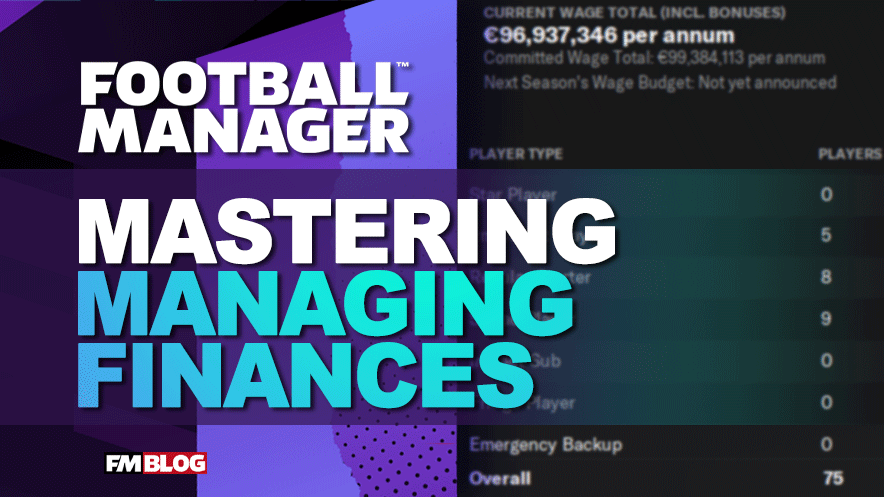Kick Financial Struggles to the Sideline: 6 Pro Tips to Manage Cash-Strapped Teams Like a Boss in Football Manager
1 . Develop a Strategic Transfer Policy
When facing financial constraints, it's crucial to adopt a strategic approach to transfers. Focus on acquiring players who offer the best value for money. Look for free agents who can immediately strengthen your squad without incurring transfer fees. Loan deals can be another cost-effective option, allowing you to bring in talented players temporarily without committing to long-term contracts or hefty transfer fees.
Scouting becomes even more critical when you're financially limited. Invest as much as you can in a robust scouting network and assign scouts to regions known for producing young talents or undervalued players. If you’re in one of those regions, look into lower leagues where the chances are lower but the payout is greater.
By identifying hidden gems, you can secure quality players at affordable prices. Pay attention to their potential and consider their resale value, as selling them at a profit can significantly improve your financial situation in the future.
2 . Mind the Double-edged Sword of Youth Development
Developing young players within your own academy is an excellent way to build a competitive squad while keeping costs low. Invest in your youth infrastructure and coaching staff to maximize the potential of your young talents. Offer them opportunities to train with the first team and gain valuable match experience through loan spells at lower-league clubs. Monitor their progress closely and gradually integrate them into the senior squad when they are ready to contribute. By nurturing your own talent, you not only save money on transfer fees and wages but also have the potential to sell developed players for significant profits.
However, also be mindful that this can incur additional costs that may prove too much for your team. If you’re managing a side from a region where youth talent isn’t up to the required level, or you don’t have the required facilities to get players who can make an impact on your side, focusing on this can get you far more cost than benefit, as youth players have a fixed salary, and the coaching structure required to develop them also can be a burden on your finances. If you aren’t getting solid players often enough, scrap it all and wait until you have the necessary resources.
3. Prioritize Wage Structure
A balanced wage structure is vital for maintaining financial stability. Ensure that your wage budget is distributed wisely and fairly among your squad members. Avoid offering exorbitant salaries to star players or signing bonuses that can strain your finances. Instead, focus on performance-based contracts, providing incentives for achieving specific goals, such as goals scored, clean sheets, or appearances.
Regularly review your squad's wages and renegotiate contracts when necessary. Consider offering extensions to players who have demonstrated consistent performance and loyalty to the club while reducing wages for underperforming players or those who no longer contribute significantly, and don’t be afraid to cut someone loose if they are asking for money you don’t think they can justify. Striking a balance between motivating your players and keeping your wage bill under control is key to long-term financial success.
4. Optimize Squad Depth
While having a small squad can save on wages, it also increases the risk of being unable to cope with injuries, suspensions, or fixture congestion. Strive to maintain a balanced squad depth by signing versatile players who can cover multiple positions. This will save you more than one headache if a key player goes down with an injury, as you can seamlessly carry on, not having to rethink your gameplan.
Having players who can adapt to different roles on the pitch allows you to handle unforeseen circumstances without the need for panic signings or paying inflated fees for replacements.
5. Generate Additional Revenue
While this is one of the hardest things to do as a manager, you’ll want to explore various avenues for generating additional revenue. Winning on the pitch is the number one way you can improve your team’s finances, but it’s not the only one. Consider organizing friendly matches against high-profile teams during preseason or international breaks. Such matches can draw significant crowds, generating gate receipts that contribute to your club's income.
Furthermore, explore the possibility of making some exotic signings to boost your club's international profile. Having high reputation players will impact your commercial appeal, regardless of whether they are top starters or benchwarmers, so be on the look for old rock stars who you can add at a lower price. Signing players from big markets such as China, the USA, India and South Korea can have similar effects.
6. Focus on Player Sales
Strategic player sales can be a substantial source of income for financially struggling teams. Continuously evaluate your squad and identify players who are surplus to requirements or whose market value has reached its peak. Actively market these players to other clubs, seeking reasonable transfer fees or including sell-on clauses that entitle your club to a percentage of any future transfer fee.
Balancing the sale of high-value assets with the development of promising young talents can significantly boost your financial position in the long run. However, ensure that player sales do not compromise the overall quality of your squad. Always consider the team's short-term needs and maintain a competitive edge on the pitch.
Final Words
Managing a team that’s struggling financially is one of the hardest challenges in Football Manager. Money wins championships and lack of it can be the start of a downward spiral. Hopefully, by implementing these expanded tips, you'll be better equipped to navigate financial difficulties in Football Manager. Remember, prudent decision-making, long-term planning, and a focus on sustainable growth are key to achieving financial stability and on-field success.





















